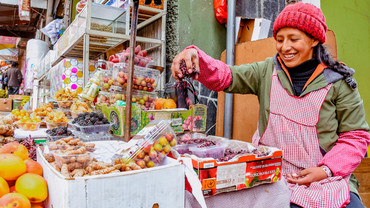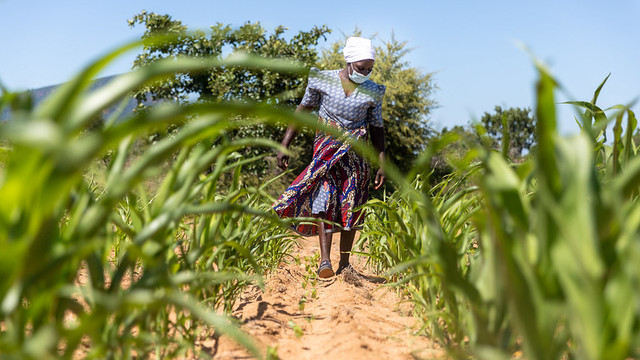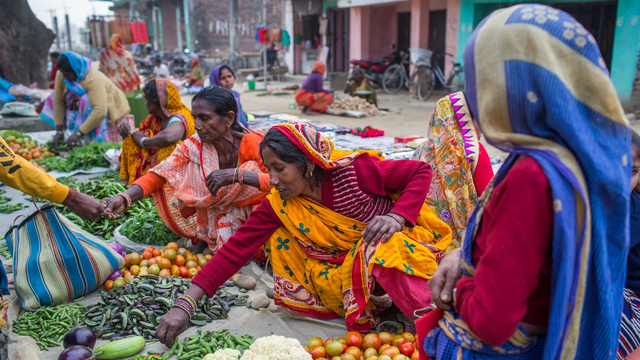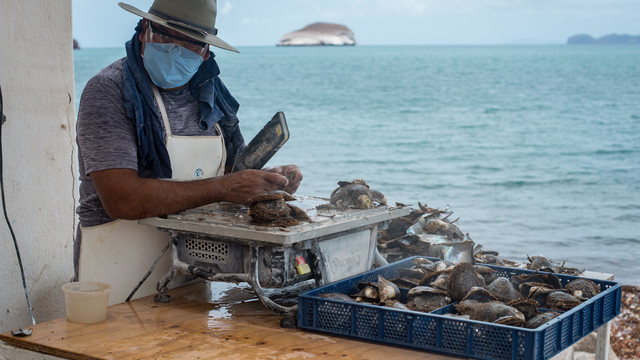How people are providing evidence, and influencing to get food policies that work for them
Food policies that are based on evidence and advocacy delivered by citizens are more likely to benefit those whose lives they affect most. An event this week heard how connecting people to policy can help secure healthy and more sustainable diets for everyone.



The Sustainable diets for all programme recognises that people – with their capacity to innovate and power to drive change – must be at the centre of efforts to reshape our failing food systems (Photo: © Mauricio Panozo of Lucano photography. Bolivia, La Paz)
Many of today’s social and environmental problems stem from the food we eat: our diets are making us unhealthy, putting huge burdens on public health systems everywhere, and depleting our water and natural resources. What if we all had healthier, more sustainable diets?
Sounds good, but what does this look like in practice? Experts’ opinions about the right kinds of diets and of the policies needed to achieve them are often blind to the realities of how people – especially the poor – experience food in their daily lives.
IIED, Hivos and partners are taking a citizen-led approach to food research and policy-making as part of the Sustainable Diets for All programme. We are working with civil society organisations (CSOs) in developing countries to understand the food issues that matter to people in their own contexts, and working with low income citizens to gather evidence that can support their own policy agenda. This will help make policy more relevant to the daily lives and needs of poor people that use and work in the food system.
We have developed two new resources, a food systems advocacy toolkit and a report on citizen generated evidence. These are aimed at helping CSOs and citizens find common ground on diet related issues, and work together through evidence generation and advocacy to defend and improve food systems, particularly in the informal sector.
These two documents were launched during this week’s City University Food Policy Symposium. The event’s theme ‘connecting people with food policy’ explored how gathering, translating and using evidence of lived experience of food-related problems can make food policy more relevant to those whose lives they affect most.
Through a series of short presentations, speakers from national and international projects shared research lessons on how to best listen to and learn from people’s lived experience. The event also highlighted the importance of sharing these experiences in policy making processes and political spaces.
What is citizen-led evidence generation, and why do we need it?
Far too often, the day-to-day realities of low-income people and the informal markets that form the backbone of their food consumption habits are invisible to policymakers. Without clear, visible evidence of the food-related problems low income citizens face, outsiders make assumptions about poor peoples’ priorities, knowledge and agency.
This can heighten political exclusion and lead to legislation, planning and allocation of resources that may at best overlook and at worst run counter to the interests of the poorest.
We need new ways of connecting citizens to policymaking. Citizen-generated evidence, either through primary data collection or from gaining access to existing information, creates a crucial inroad for dialogue between low-income people and the policy makers that make decisions on food system issues.
This was demonstrated when low income food producers and vendors gathered with policy makers in a Zambian ‘food lab’ to map different elements of the local food system in Chongwe district. Food producers, vendors and a range of other actors identified issues and policies within the food system, bringing new perspectives which were then put to policy makers.
How citizen-centred advocacy connects people to policy
The enduring tendency towards ‘participation-lite’ advocacy techniques and tools that extract information from communities without involving them in agenda setting, or fail to create spaces for citizens where political decisions are made, must also be challenged.
Advocacy delivered by or with people who live with the impacts of limited dietary choice is often very powerful, particularly when this work goes beyond providing citizen ‘voice’ and extends to citizen inclusion in all steps of an advocacy planning process.
To successfully engage citizens in advocacy, our approaches are designed around the constraints citizens face, in particular women in low income countries, where heavy labour pressures and household and family commitments mean women are unable to participate in advocacy planning workshops. Illiteracy is a further challenge which is more common in women than men. Workshops need to be delivered in small group discussions and in the local language.
Getting policymakers to listen
So where to from here? Policymakers, urban and rural local government officials as well as non-governmental organisations (NGOs) themselves need to adapt their learning style to seek out, value and interpret citizen-generated evidence and respond to calls to action from citizen groups.
A more diagnostic and collaborative approach from policymakers will give low income citizens reason to trust the policy process. This will mark a welcome step forward from the status quo where low income citizens are often suspicious of initiatives that seek to 'improve' the food system of the poor – many such initiatives in the past have not tangibly improved lives.
Rather than telling poor people what they should eat, it is time to listen to them, to work with them to record dietary patterns through food diaries, to document food culture through photo stories and video, and support citizen groups to change the way that policy makers think.
About the author






